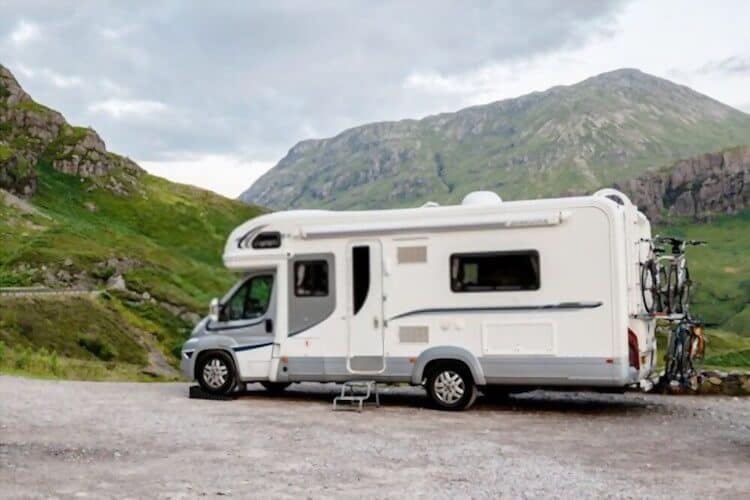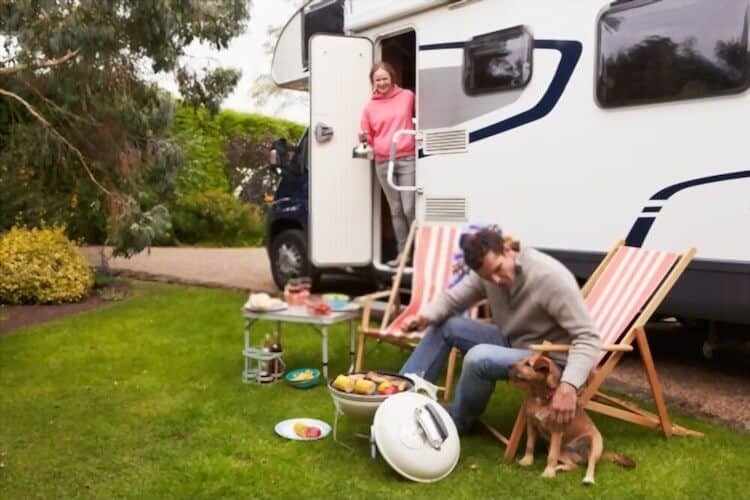Published Date: August 11, 2020
Last Updated on December 24, 2022 by Camper Front
Exactly how much weight do you add to a camper?
Just as you need to know your camper’s dry weight, it’s height limitations width limitations; you also need to how much weight you add to your camper.
This will prevent you from overloading your camper and adding additional strain to your gas mileage and other complications.
Here’s what you need to know about the weight limitations on a camper.
Table of Contents
How Much Weight Do You Add To A Camper?
Knowing the right amount of weight to add to a camper is very critical because weight loaded toward the rear can dramatically affect the handling characteristics of the whole trailer.
Every vehicle has its limitations listed out in the manual or instructions guide, here’s a list of definitions that will help you understand what each of them means.
Gross Vehicle Weight Rating (GVWR)
This is the maximum weight of the vehicle or trailer when fully loaded for travel.
This includes the unloaded vehicle weight, extra equipment or accessories, cargo, passengers, and liquids. The tow vehicle and trailer each have their own GVWR.
Unloaded Vehicle Weight: This is the dry weight of the camper with no gear, no fluids, and no additional items. This is the exact structure weight before it’s prepped to hit the road.
Dry Weight
Dry Weight is like Curb Weight, except all of the camper’s consumables such as washer fluid, oil, fuel, coolant, etc. are not added to the calculation.
Cargo Carrying Capacity
This is the highest amount of weight your cargo and gear should amount to. You can weigh your items separately before loading, to carefully keep track of your cargo’s weight.
Gross Combined Weight Rating
The GCWR is the total weight of absolutely everything.
When you total the vehicle, everything inside the vehicle, the towing apparatus, the gears, and the trailer, it should be less than this number.
How to Determine the Weight You Add to Your Camper

The best way to determine the amount of weight you add to your camper is to deduct the weight of all possible passengers – both people and pets.
Then as you load your items into your camper, first of all, place them in cardboard boxes and then weigh them on your bathroom scale before you take them into your camper.
This way, you have an idea of the amount of weight you are adding to the camper. Also, keep a close tab, and you should be reasonably close to what your camper’s gross weight has now become.
Once everything is all loaded in, go back to the truck scale and see what your camper’s weight is now. If you still have a nice amount of weight capacity left, then you’re good to go!
Why You Need to Manage Your Camper’s Weight
Managing the gross weight of your camper is very necessary to avoid complications or damage to the camper itself
Your Brakes Could be Offset
When it comes to weights, you want to keep in mind that the more weight you have, the more difficult it will be to stop in the case of an emergency.
So for your own safety, you need to stay as light as possible; you are not just risking your life out there, you are risking that of others as well.
You will also be causing damage to your brake pads. So you really need to be mindful of the weight added to your camper in order to have a safe trip.
You could get a ticket
You may or may not know this, but there are actually weigh station checkpoints and police officers with portable scales that are placed along the major highways to monitor vehicles hauling various cargo.
Some of these weigh stations can require campers to stop, but the requirements for these stops vary from state to state.
You could have to deal with a hefty fine if the weight being hauled exceeds the tow rating that is listed on the inside of your tow truck door.
Do Not Max Out Your Towing Capacity
The best way to find out if you can tow your camper is to take the dry weight and add then 1,500 pounds (if you’re traveling with a family).
This accounts for extra add-ons like gear, passengers, and liquids. But you want to make sure that this number is not more than 85% of your vehicle’s towing capacity.
Depending on the number of passengers, you will not need as much add-on traveling solo as you would with a family. However, it’s still imperative to make sure that you’re within the safe tow range for your vehicle.
When looking for your vehicle’s tow range, it’s recommended to check the sticker inside the door to get the exact ratings for your vehicle’s model and if there’s any special towing package, or dealer accessories installed.
This is the best way to know the exact details of your specific vehicle. Also, you do not want to get a trailer that matches your vehicle’s exact towing capacity or is just a bit over.
This can cause damage to your transmission and engine over time. Because you are going to end up pulling a load too heavy, and you may also not be able to make it up hills.
For that reason, you want to go for a trailer with a far higher tow rating, Not to mention you need to leave some room for error from manufacturers.
Measuring The Weight Of Your Camper

The best way to get an accurate measurement is to make use of a local CAT scale or other equivalent roadside scales. All you need to do is drive onto the platform, and you get a reading of your total camper weight.
It is recommended you do this procedure loaded up with the total weight you plan on traveling with. This includes the trailer, gears, liquids, passengers, and cargo.
This is to make sure you’re within the load limits safe for your vehicle before embarking on your journey.
Conclusion
It is a general rule when getting a camper; you should ascertain the unloaded vehicle weight and then add on approximately 1,500 lbs for extra add-ons, this will give you an idea of what the total gross weight will be.
You need to make sure that you know how much weight you add to a camper and that you are considering all the features required for safe travel, such as brake and tow ratings, to name a few.
So, how much weight do you add to a camper? I guess you know the answer now. Do let us know if you have any more questions related to camper weight.

